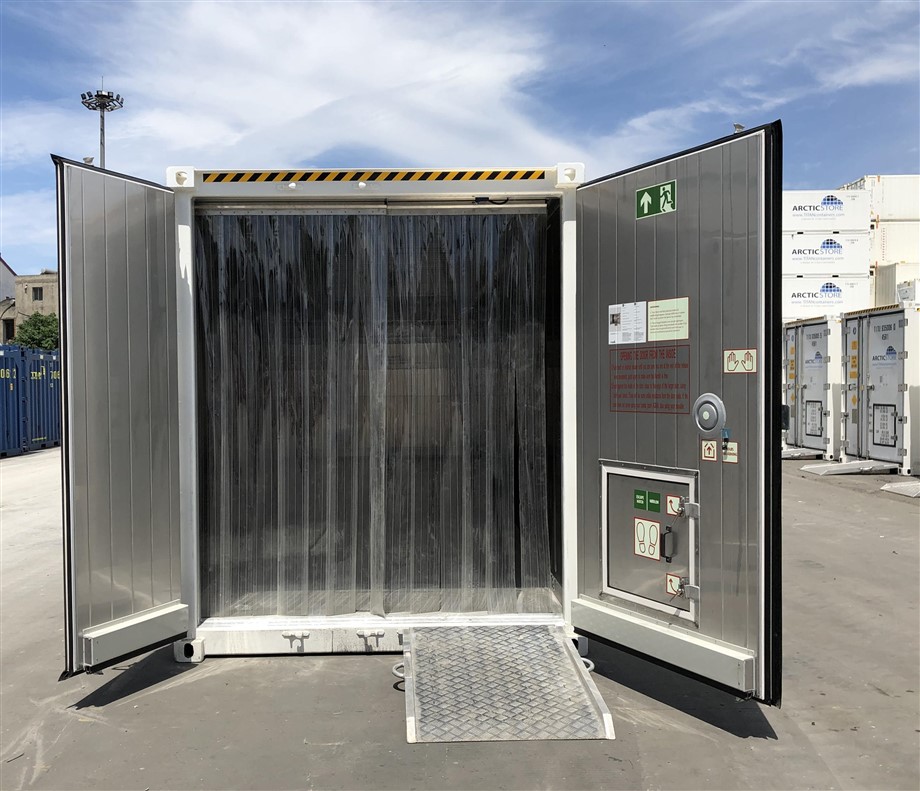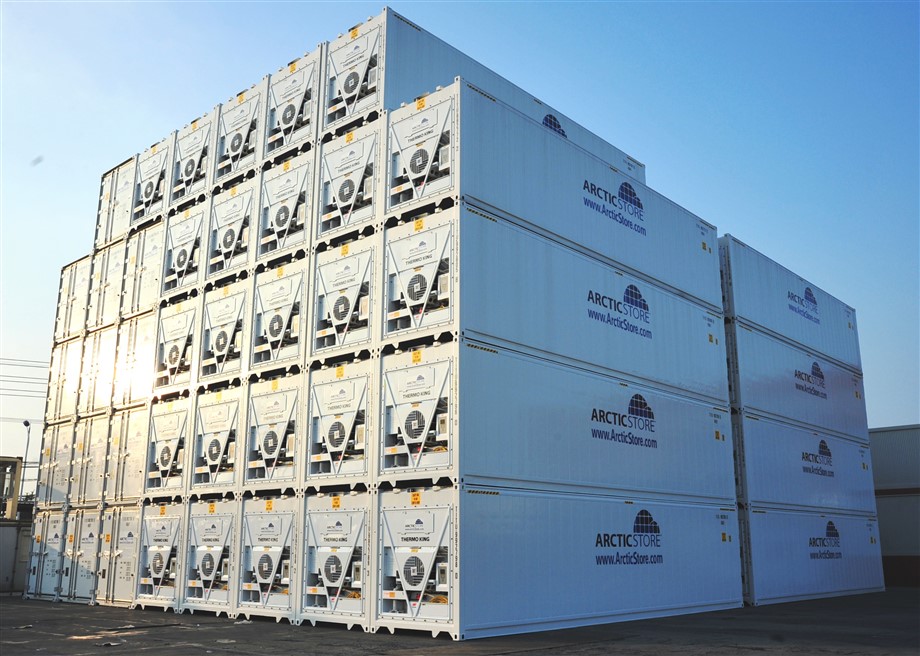Everything About Cold Store Containers: Essential Insights for Your Storage Requirements
Cold storage containers play a crucial role in the preservation of disposable goods. They can be found in numerous kinds, including chilled and protected systems, each created for certain storage space demands. Comprehending the advantages and key attributes of these containers is important for organizations aiming to maximize their operations. As the need for effective storage space options grows, checking out the different alternatives available can bring about educated decisions that impact both profitability and sustainability. What aspects should one take into consideration when picking the appropriate container?
Kinds Of Freezer Containers
Freezer containers can be found in numerous types, each made to fulfill certain temperature level control demands. Among the most common kinds are refrigerated containers, which keep temperatures between 0 ° C to 10 ° C, making them appropriate for subject to spoiling items like fruits, veggies, and milk products. An additional type is the deep fridge freezer container, which operates at temperatures below -18 ° C, perfect for long-term storage space of frozen items such as meats and fish and shellfish.
Shielded containers offer temperature stability without energetic air conditioning, making them beneficial for short-term transportation of temperature-sensitive items. Furthermore, there are portable cold store devices, which supply versatility in locations and are typically made use of in events or seasonal operations. Lastly, blast chillers quickly decrease the temperature of hot foods, making sure safety and security and high quality. Each type offers an one-of-a-kind purpose in numerous markets, from food solution to drugs, emphasizing the relevance of selecting the ideal container for specific storage space needs.

Benefits of Utilizing Freezer Solutions

Cold storage options expand the shelf life of products, decreasing waste and enhancing productivity for services. By successfully managing stock with proper temperature control, companies can enhance their supply chains and improve functional effectiveness.
Additionally, freezer centers permit for flexible storage options, fitting various volume requirements and seasonal variations in need (used 40ft refrigerated shipping containers). This versatility helps services respond promptly to market modifications
Using cold storage space remedies can ensure conformity with health and wellness and safety and security laws, safeguarding both businesses and consumers. On the whole, the tactical use cold storage improves product administration while promoting sustainability and economic practicality.
Trick Functions to Search For in Cold Storage Containers
When selecting cool storage space containers, numerous vital features benefit mindful consideration to safeguard peak performance and integrity. Temperature level control capacities are essential; containers should keep regular temperature levels appropriate for certain products. Insulation quality additionally plays a significant role, as superior insulation lowers power usage and improves temperature security.
Next off, simplicity of gain access to and loading is important; containers must use straightforward layouts for efficient handling and company. Sturdiness is one more crucial aspect; weather-resistant products ensure durability and safeguard components against ecological variables.
In addition, wheelchair functions, such as built-in wheels or raising points, facilitate transportation, while personalized layouts enable tailored storage space services.
Lastly, monitoring systems, consisting of temperature level alarm systems and remote monitoring, supply real-time updates, ensuring that problems stay ideal. By concentrating on these functions, customers can choose cool storage containers that satisfy their functional demands properly.
Selecting the Right Cold Store Container for Your Needs
Picking the best freezer container needs a thoughtful assessment of certain requirements and functional requirements. Aspects such as the sort of products being kept, temperature level sensitivity, and volume ought to be focused on. As an example, perishable food products may demand containers with rigorous temperature controls, while pharmaceuticals may need exact problems to keep efficiency.
In addition, potential individuals must consider the container's size and flexibility. A bigger system might be needed for mass storage, while smaller sized, mobile alternatives can be excellent for short-term or on-site needs. Insulation quality and energy efficiency are also crucial, as these will impact functional prices and temperature level security.
Finally, conformity with market policies and standards is important, especially in industries like food and health care. By meticulously evaluating these elements, individuals can select a cold store container that successfully fulfills their one-of-a-kind demands and assurances optimal storage space conditions.
Best Practices for Keeping Freezer Conditions
Maintaining excellent cold store conditions is important for maintaining the high quality and safety of temperature-sensitive items. Consistently keeping track of temperature and moisture degrees is vital; browse around this site using trusted digital thermostats and hygrometers can supply accurate analyses. Correct insulation of cold storage containers helps reduce temperature level fluctuations and power loss.
Executing a first-in, first-out (FIFO) system assures that older inventory is utilized prior to newer stock, minimizing waste (used 40ft refrigerated shipping containers). Additionally, preserving an arranged format within the storage space enables for far better airflow and reduces the danger of cross-contamination
Regular upkeep checks on equipment, such as seals and compressors, are necessary to avoid breakdowns. Team training on best practices for packing and discharging items aids preserve temperature level integrity. Finally, keeping doors closed as much as possible limitations warm exchange, assuring that the cool storage space setting remains steady and effective in protecting useful items.
Expense Factors To Consider for Cold Storage Space Solutions
When evaluating freezer solutions, it is vital to take right into account the preliminary investment costs together with ongoing operational expenses. A thorough breakdown of these costs can disclose substantial lasting cost savings potential for organizations. Recognizing these monetary aspects aids stakeholders make notified decisions concerning their freezer demands.

Preliminary Financial Investment Expenses
The monetary landscape of cold store containers provides different preliminary financial investment expenses that services have to consider. These costs usually include the purchase or rental price of the containers, which can vary based on type, insulation, and size high quality. Furthermore, expenses connected to retrofitting existing structures to suit cold store has to be factored in, specifically if specialized equipment is required. Setup expenses, consisting of electric job and refrigeration systems, additionally add to the general preliminary investment. Companies should not forget transport expenses for delivering containers to their wanted area. Ultimately, prospective modification choices, such as shelving or temperature surveillance systems, can further influence the first monetary investment. Cautious budgeting for these variables is crucial for successful cold store execution.
Operational Costs Break Down
Functional expenses for cold store services incorporate several important cost factors to consider that companies have to navigate. Trick factors consist of power costs, which can be considerable due to the requirement to keep low temperature levels. Upkeep expenses are likewise substantial, as regular maintenance is essential to guarantee devices runs efficiently and stays certified with wellness and safety requirements. In addition, labor expenses may emerge from the need for specialized staff to take care of and check the storage space atmosphere. Insurance coverage expenses are another consideration, as business need to shield their financial investments versus possible losses. Any type of prospective Learn More Here regulative conformity expenses need to be factored in, as businesses might need to invest in systems that adhere to food safety and security and environmental regulations. Understanding these expenditures is important for efficient budgeting.
Long-Term Savings Prospective
Investing in chilly storage solutions uses considerable lasting savings possibility, changing preliminary expenditures into economic effectiveness in time. By minimizing perishing and waste, companies can boost their revenue margins considerably. Advanced insulation and energy-efficient systems reduce utility costs, which accumulate over the life-span of the devices. Chilly storage containers often call for less regular upkeep contrasted to conventional refrigeration approaches, leading to lower fixing costs. The capacity to store items for extended durations without compromising high quality permits companies to take advantage of market changes, maximizing income. Additionally, the scalability of cool storage remedies allows firms to adapt to changing demands without incurring extreme prices. In general, these aspects contribute to an engaging case for cold store as an economical financial investment technique.
Often Asked Inquiries
How Much Time Can Food Be Saved in Freezer Containers?
The period food can be kept in freezer containers differs by kind. Typically, subject to spoiling products last from days to weeks, while icy foods can remain safe for months, depending upon appropriate temperature level and storage space problems.
Are Cold Storage Containers Energy-Efficient?
The energy effectiveness of chilly storage space containers differs based upon design and insulation high quality. Modern units frequently utilize sophisticated innovation to reduce energy usage, eventually adding to minimized functional expenses and environmental effect in long-lasting use.
Can Freezer Containers Be Personalized for Particular Requirements?
Freezer containers can my company undoubtedly be personalized to satisfy certain demands. Alterations may include temperature level controls, dimension changes, and extra attributes, permitting individuals to tailor services efficiently for various storage needs and functional choices.
What Are the Typical Sizes of Cold Store Containers?
Cold store containers generally are available in common dimensions such as 10, 20, and 40 feet. These dimensions fit different storage demands, making sure versatility for organizations requiring temperature-controlled atmospheres for disposable items or sensitive materials.
Do Cold Store Containers Require Unique Licenses for Use?
Freezer containers commonly require special authorizations for use, depending on neighborhood policies and intended applications. Authorities may mandate permits to ensure safety criteria, environmental conformity, and proper functional practices are kept during their utilization.
Cold storage space containers come in various kinds, each developed to meet details temperature control demands. In addition, cold storage space facilities enable for adaptable storage alternatives, fitting various quantity requirements and seasonal fluctuations in demand. Picking the appropriate chilly storage container calls for a thoughtful evaluation of particular demands and operational demands. The monetary landscape of cool storage containers provides different first investment expenses that organizations must think about. Cold storage space containers can without a doubt be customized to satisfy certain demands.